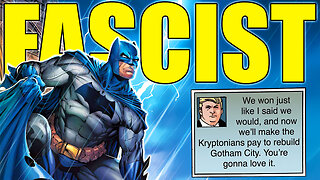Premium Only Content

Les Miserables by Victor Hugo | Summary and Critique
Buy Here: https://amzn.to/4gYqCfK
"""Les Miserables"" is a novel by the French author Victor Hugo. It tells the story of Jean Valjean, a former convict who is pursued by the police inspector Javert, and his encounters with a host of other characters in 19th-century France.
The novel begins with Valjean's release from prison after serving a 19-year sentence for stealing a loaf of bread. Despite his efforts to turn his life around, he is constantly hounded by Javert, who sees Valjean as irredeemable. Valjean's life changes when he meets a bishop who shows him mercy and kindness. Valjean becomes a successful businessman and adopts the orphaned Cosette, whom he raises as his own daughter.
Meanwhile, the novel also follows the stories of several other characters, including Fantine, a young woman who falls into poverty and prostitution, and Marius, a student who becomes involved in a revolutionary movement. The novel explores themes such as justice, redemption, and the struggle for social justice.
Critics have praised ""Les Miserables"" for its epic scope, its vivid characterization, and its powerful depiction of social injustice. The novel is also celebrated for its lyrical prose and its portrayal of the beauty and tragedy of human life.
However, some readers have criticized the novel for its sentimentality and its tendency towards melodrama. Additionally, some scholars have argued that the novel is overly idealistic in its portrayal of the revolutionary movement and its solutions to social problems.
Overall, ""Les Miserables"" is a landmark work of literature that continues to be studied and appreciated for its artistic achievements and its enduring themes. It has been adapted into numerous stage productions, films, and other media, and its impact on literature and culture cannot be overstated."
-
 2:06:32
2:06:32
TimcastIRL
4 hours agoLeftist NO KINGS Protest Begins, Antifa EMBEDS, Riots & Violence FEARED Nationwide | Timcast IRL
148K95 -
 2:50:31
2:50:31
TheSaltyCracker
4 hours agoHail to the King ReeEEStream 10-17-25
39.2K120 -
 56:04
56:04
Man in America
11 hours agoGold’s OMINOUS Warning: A Global Monetary Reset That’ll BLINDSIDE Americans
9.78K4 -
 DVR
DVR
Flyover Conservatives
22 hours ago3 Winning Mindsets for Building Life-Changing Habits - Clay Clark; Why Employers Are Ditching DEI - Andrew Crapuchettes | FOC Show
13K -
 LIVE
LIVE
SynthTrax & DJ Cheezus Livestreams
1 day agoFriday Night Synthwave 80s 90s Electronica and more DJ MIX Livestream POST DISCO / FUNK / R & B Edition
254 watching -
 51:18
51:18
Degenerate Jay
12 hours ago $0.30 earnedJournalist Claims Batman Is A Fascist Like Donald Trump
5.57K6 -
 1:18:27
1:18:27
Glenn Greenwald
8 hours agoGlenn Takes Your Questions on Major Saudi Arabia Celeb Controversies, Zohran Mamdani and the NYC Debate, Anti-ICE Protests, and More | SYSTEM UPDATE #533
104K31 -
 1:13:26
1:13:26
Tundra Tactical
9 hours ago $3.22 earned🛑{LIVE NOW} Gun Nerd Plays Battlefield 6 Great Tundra Nation Get Together Day 4
16.9K1 -
 LIVE
LIVE
GritsGG
8 hours agoRanked Top 70! Most Wins in WORLD! 3734+!
125 watching -
 14:41:39
14:41:39
LFA TV
1 day agoLIVE & BREAKING NEWS! | FRIDAY 10/17/25
206K47